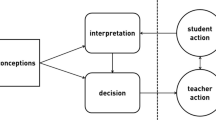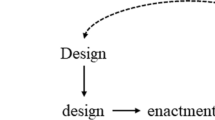Abstract
Studies show that extending students’ mathematical thinking during whole-group discussions is a challenging undertaking. To better understand what extending student thinking looks like and how teachers’ mathematical knowledge for teaching (MKT) supports teachers in their efforts to extend student thinking, the teaching of six experienced elementary school teachers was explored. During group discussions, all six teachers created opportunities for extending student thinking about important mathematical ideas and solution methods. Findings on the nature of these episodes include identification of individual instructional actions and the ways in which teachers’ MKT was connected to these actions.
Similar content being viewed by others
References
Ball, D. L. (1993). With an eye on the mathematical horizon: Dilemmas of teaching elementary school mathematics. The Elementary School Journal, 93(4), 373–397.
Ball, D. L., & Bass, H. (2000). Making believe: The collective construction of public mathematical knowledge in the elementary classroom. In D. Phillips (Ed.), Yearbook of the national society for the study of education: Constructivism in education (pp. 193–224). Chicago: University of Chicago Press.
Ball, D. L., Bass, H., & Hill, H. C. (2004). Knowing and using mathematical knowledge in teaching: Learning what matters. Paper presented at the 12th annual conference of the Southern African association for research in mathematics, science, and technology education, Cape Town, South Africa.
Ball, D. L., Lubienski, S. T., & Mewborn, D. S. (2001). Research on teaching mathematics: The unsolved problem of teachers’ mathematical knowledge. In V. Richardson (Ed.), Handbook of research on teaching. New York: Macmillan.
Ball, D. L., Thames, M. H., & Phelps, G. (2008). Content knowledge for teaching: What makes it special? Journal of Teacher Education, 59(5), 389–407.
Fraivillig, J. L., Murphy, L. A., & Fuson, K. C. (1999). Advancing children’s mathematical thinking in everyday mathematics classrooms. Journal for Research in Mathematics Education, 30(2), 148–170.
Grant, T. J., Kline, K., Crumbaugh, C., Kim, O. K., & Cengiz, N. (2009). How can curriculum materials support teachers in pursuing student thinking during whole-group discussions? In J. T. Remillard, B. A. Herbel-Eisenmann, & G. M. Lloyd (Eds.), Mathematics teachers at work connecting curriculum materials and classroom instruction (pp. 103–117). New York, NY: Routledge.
Heaton, R. M. (2000). Teaching mathematics to the new standards: Relearning the dance. New York: Teachers College Press.
Hiebert, J., & Grouws, D. A. (2007). The effects of classroom mathematics teaching on student learning. Reston, VA: National Council of Teachers of Mathematics.
Hill, H., Blunk, M. L., Charalambous, C. Y., Lewis, J. M., Phelps, G. C., Sleep, L., et al. (2008). Mathematical knowledge for teaching and the mathematical quality of instruction: An exploratory study. Cognition and Instruction, 26, 430–511.
Hill, H. C., Rowan, B., & Ball, D. L. (2005). Effects of teachers’ mathematical knowledge for teaching on student achievement. American Educational Research Journal, 42(2), 371–406.
Hill, H. C., Schilling, S. G., & Ball, D. L. (2004). Developing measures of teachers’ mathematics knowledge for teaching. The Elementary School Journal, 105(1), 11–30.
Lampert, M. (1990). When the problem is not the questions and the solution is not the answer: Mathematical knowing and teaching. American Educational Research Journal, 27(1), 29–63.
Lampert, M. (2001). Teaching problems and the problems of teaching. New Haven, CT: Yale University Press.
National Council of Teachers of Mathematics. (1989). Curriculum and evaluation standards for school mathematics. Reston, VA: NCTM.
National Council of Teachers of Mathematics. (2000). Principles and standards for school mathematics. Reston, VA: NCTM.
Research Ware, I. (2007). HyperResearch: Qualitative analysis tool (version 2.8). Randolph, MA: ResearchWare, Inc.
Russell, S. J. (2007). The case of investigations in number, data, and space. In C. R. Hirsch (Ed.), Perspectives on design and development of school mathematics curricula (pp. 23–35). Reston, VA: NCTM.
Schifter, D., & Fosnot, C. T. (1993). Reconstructing mathematics education. New York: Teacher College Press.
Shulman, L. S. (1986). Those who understand: Knowledge growth in teaching. Educational Researcher, 15(2), 4–14.
Stein, M. K., Grover, B. W., & Hanningsen, M. (1996). Building student capacity for mathematical thinking and reasoning: An analysis of mathematical tasks used in reform classrooms. American Educational Research Journal, 33(2), 455–488.
Stein, M. K., Smith, M. S., Henningsen, M. A., & Silver, E. A. (2009). Implementing standards-based mathematics instruction: A casebook for professional development (2nd ed.). New York, NY: Teachers College Press.
TERC. (1998). Investigations in number, data, and space. Menlo Park, CA: Dale Seymour.
TERC. (2008). Investigations in number, data, and space (2nd ed.). Glenview, IL: Pearson.
Wood, T. (1999). Creating a context for argument in mathematics class. Journal for Research in Mathematics Education, 30(2), 171–191.
Wood, T., Cobb, P., & Yackel, E. (1991). Change in teaching mathematics: A case study. American Educational Research Journal, 28(3), 587–616.
Author information
Authors and Affiliations
Corresponding author
Rights and permissions
About this article
Cite this article
Cengiz, N., Kline, K. & Grant, T.J. Extending students’ mathematical thinking during whole-group discussions. J Math Teacher Educ 14, 355–374 (2011). https://doi.org/10.1007/s10857-011-9179-7
Published:
Issue Date:
DOI: https://doi.org/10.1007/s10857-011-9179-7




